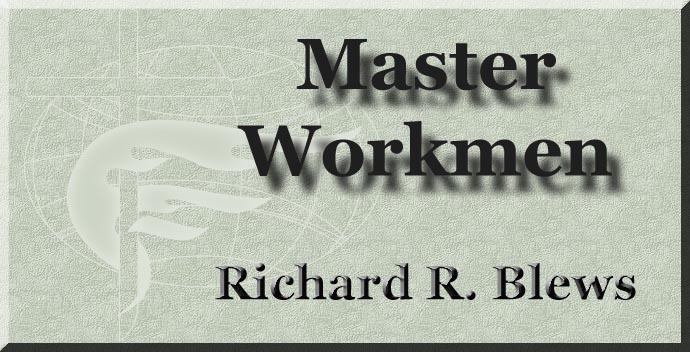
Master Workmen
By Richard R. Blews
Introduction
|
Not always does a liberal education confer skill and grace in verbal expression, but in Dr. Blews the scholar and the writer find a happy combination. Trained under eminent scholars in American and European universities he has the technique of the historian and the skill of the literary artist. His book, MASTER WORKMEN, will compare very favorably in attractiveness and strength of diction with the standard works of historians and biographers in general. Extensive research is evident, and the reader will derive both profit and pleasure from the perusal of the biographies of the eminent men whose lives and works the author vividly portrays -- our bishops now within the veil. As in the political world, so in the ecclesiastical, strong movements stand virtually connected with men of mark. In the latter the power of the gospel of Christ is the main essential, while native endowment and the equipment of a comprehensive education are in their place of great value. Evidently the design of God for the nineteenth century included the formation of the Free Methodist Church, whose cardinal distinction is the retention of the Wesleyan, the Scriptural, doctrine, together with the experience of entire sanctification, that grand climax in deliverance from sin. Rev. B. T. Roberts became the chief founder of the church, and very naturally the author describes him and his ministry the most fully of all the deceased bishops. The writer has clearly used the balances of the sanctuary in his just character estimates. No one-sided account is given of the noble men so prominent in the life of the church, and who now rest from their labors. Of course each one of the bishops differed from the other, for one common mold of personality would be impossible in a world that by the wisdom of God is filled with variety. Nor would it be desirable. One feature, however, was common to them all: In experience and in preaching they continually upheld the original doctrines, and the church has been unchangeably devoted throughout its area, and throughout its history, to the apostolic, the truly Christian standards. No novelist can invest his fiction characters, or construct his plots, to evoke the same interest that attaches to real persons and their acts. The men of the book were very real, and they were "lovely and pleasant in their lives." The church immeasurably enjoyed the rich fellowship and fruitful ministry of those men, who now await the resurrection of the just, and the aroma of their godly, their exceedingly valuable, lives will increasingly abide. All but the first three were my highly esteemed colleagues, and the first three I knew in gratifying estimation. William Pearce
|
|
 |
 |
|
|
|
-
Site Navigation
 Home
Home What's New
What's New Bible
Bible Photos
Photos Hiking
Hiking E-Books
E-Books Genealogy
Genealogy Profile
Free Plug-ins You May Need
Profile
Free Plug-ins You May Need
 Get Java
Get Java.png) Get Flash
Get Flash Get 7-Zip
Get 7-Zip Get Acrobat Reader
Get Acrobat Reader Get TheWORD
Get TheWORD